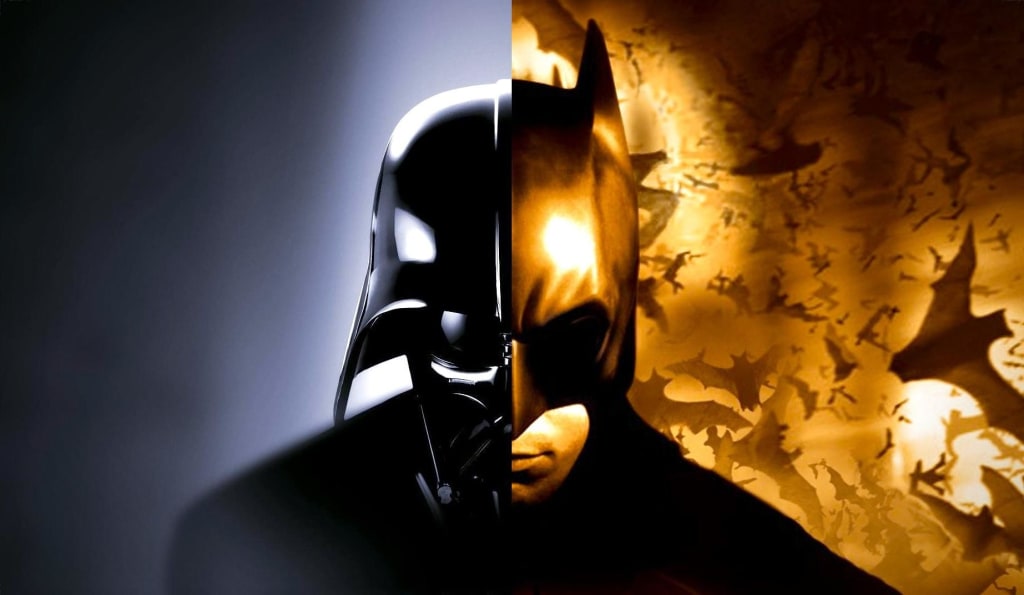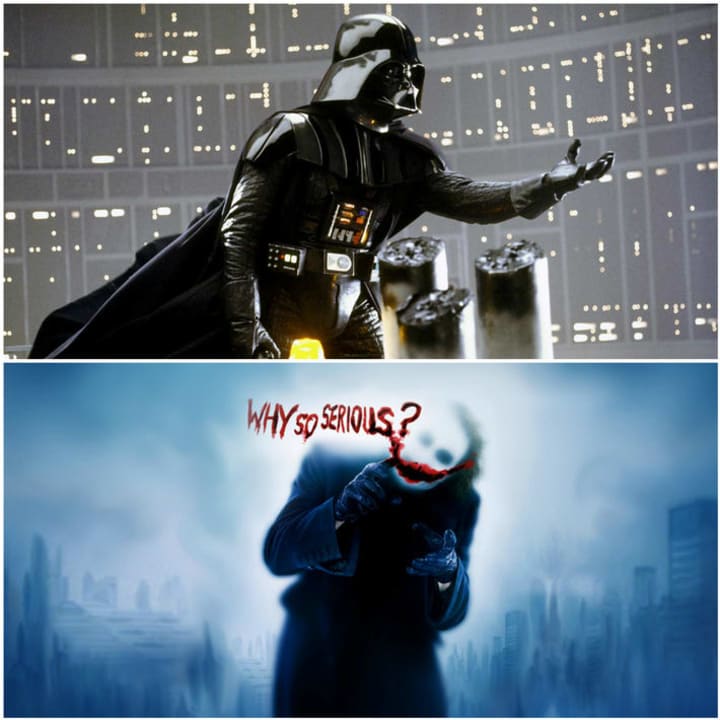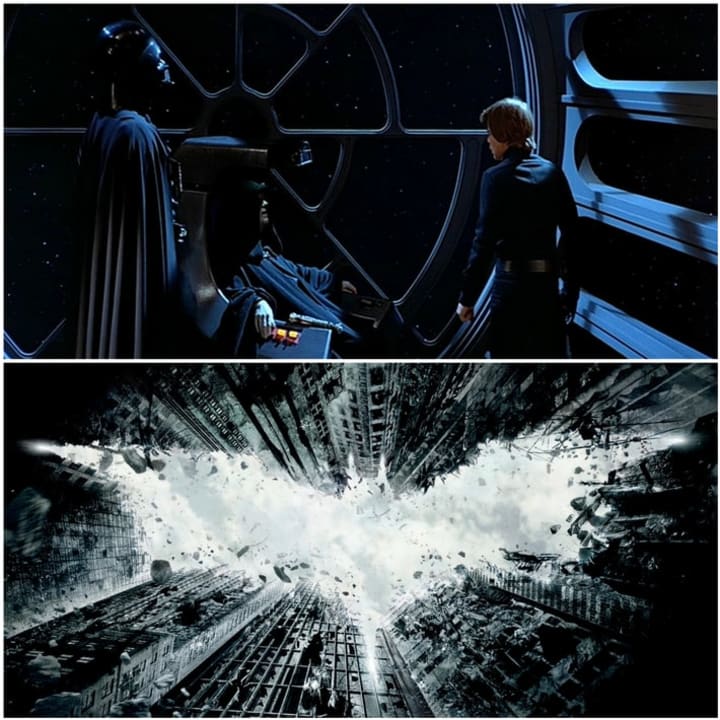My Observations on Movie Franchises Part One: Lessons Learned from Two Great Trilogies
First up: Lessons learned from Nolan's Dark Knight trilogy and the 'Star Wars' original trilogy.

As far as movies go, we are obviously living in an era of franchises. It seems that everything that has a following and is remotely profitable, could become one. From a profit point of view it makes total sense and honestly, although everything has it' s pros and cons, I rather like this trend. I like the whole world building that comes along with a franchise. I also like the fact that it enables filmmakers to use the full potential of what a certain fictional universe has to offer by being able to fully explore and open the characters and ideas that come along with it.
Of course focusing on franchises have their fair share of potential perils as well and since the focus is so heavy on them in nowadays movie industry, I figured I'd share a few observations I have made based on a selection of examples. First up : lesson' s learned from Nolan's Dark Knight trilogy and Star Wars original trilogy.
Why use these examples?
Although the focus in movie industry seems to be more and more on franchises with no clear end in sight( not necessarily a bad thing), lets focus on two trilogies (a subcategory or a more focused verison of a franchise if you will) that have a clear beginning, middle and end since it is easier to make conclusions on a finished product. Both of these two trilogies are widely regarded to be among the best ones ever created, so there should be a few lessons to learn from them.
Also, I would like to quickly point out that I am not among the people who consider the original trilogy the only "true Star Wars". I loved the Force Awakens and look forward to what is coming next. I have a soft spot for prequels and think that despite their numerous flaws, they still have their fair share of good elements in them. I also enjoyed The Clone Wars TV series ( to my initial surprise) and I am currently enjoying Rebels TV series. But I digress. The point is, that for the purpose of this article episodes IV to VI are viewed as a an alonestanding trilogy, since it is separated from all the other movies and TV, that succeeded it, by many decades.
Lesson nr. 1: Don't get ahead of yourself — make as great of a first movie as possible and go on from there.

Just focus on this one movie to be as good as possible.
I suppose it is correct to start with the most obvious point. Often we see a situation where a movie is made not to necessarily be a great movie, but to set stuff up for the next ones. So, to basically be a two or so hour commercial of what' s to come. The clear problem with this approach is that in the end, the main reason a person is going to want to see a follow up to a movie he or she just saw, is because they saw a good movie with interesting characters, story and ideas, that are set in universe one would like to visit again. That' s it. That is all. Everything else = backround noise that should be blocked. And then, when you have as great as possible movie ready, see if you can squeeze in more of set up for the future.
Furthermore, by aiming to just make as great of a movie as possible, then a good set up of characters, story and the overall universe comes along with it naturally. But it should not be the main focus. This is something that Star Wars: A New Hope and Batman Begins got absolutely right.
In both cases there was a situation where ambitious creators( Lucas and co. , Nolan and co. in short) were taking up a project that involves a fictional universe with huge potential and many fascinating ideas to explore, but also one that is hugely difficult to get right and one that comes along with a threat of becoming a huge, ambitious screw up.
Therefore, a sequel was not a sure bet my any strech of imagination. That pressure ( but also smart thinking) made creating teams behind both of these movies to focus on just making a good movie.
In terms of a potential franchise, that approach came along with another important bonus. A good movie has to have focus. Which means that one cannot throw everything they got at the screen. So, on both occasions, creators were able to focus on telling a fairly simple story and setting up the universe and characters as a part of that natural process. This enabled them to create as good as possible movie they could make at the time, while still keeping many of their trump cards for later.
That is how you set things up and what we got was Star Wars: A New Hope and Batman Begins. If you look at both of these movies, they have a fairly simple story. In New Hope it is Luke Skywlaker set on a path by taking his "first steps into a larger world", and makes something out of himself by the end of the movie. Batman Begins (similarly) is a story about how and why the world around him made Bruce Wayne the person that we know (Batman). Note, that in both of these cases, you don' t feel that you are watching a set up of greater things to come (which both movies essentially are in retrospect), but the setup is a very natural part of telling a single story.
So there you go. Batman Begins and A New Hope are, in retrospect, good (brilliant) movies that opened up a whole new universe with brilliant ideas and characters that come along with it by making them all serve a simple story. That, however, left a lot of untapped potential (because if you put all of these rich ideas/elements to serve a simple story, you can only use some of it' s potential). This is where we move on to next lesson.
Lesson nr. 2: Use all of the advantages that the "middle part" presents you with — This is where you untap the full potential.

Often, a direct sequel is an uninspired attempt to cash in on the first one and ride the succsess wave that came along with it. All the while raising the stakes not because of the natural progression of the story, but as if, to try to justify it' s existance in the first place. So, basically just doing the same thing but only more and bigger.
Granted, some movies with horrible sequels were just good standalone movies that used the potetenital the concept had to its fullest and there was nothing else to do with the concept. But usually with huge concept' s like Batman universe or Star Wars universe (as said before), there will be a lot of untapped potetntial if you just make a one simple focused story out of it. So, when one has the first movie done in the best way possible by telling a simple story and through it setting up the universe, the trick will be on how to maximise the brilliant opportunity that comes along with the "middle part."
The Brilliant Opportunity
First of all - the aim (as always) should be to make as great as possible standalone movie. The difference however is, that this time around, there will be a lot more to play with. We know the characters, the universe and the main ideas. This is a point where a filmmaker dosen' t have to hold back in order to set things up but, also, it is a point where one is in no hurry to conclude these stories. Therefore, all the focus can go on on ideas, character arcs, conflicts and upping the ante while you are at it. On a side note I would like to point out that "upping the ante" is not necessarily going bigger but going more personal, which seems to be another thing many have gotten wrong.
So what happens when one taps into the forementioned potential? The Empire Strikes Back and The Dark Knight happen. This is where a great franchise will be seperated from the others. While A New Hope and Batman Begins are brilliant movies, (argueably) their respective follow ups are the ones, that cemented these two franchises into movie history and modern folklore. Let' s take a look on how exactly they managed to do that.
Free to Explore
The lore around Batman and Star Wars are full of fascinating ideas to explore. Star Wars and the mythology around it are perfect for exploring themes like self belif, the gray areas between good and evil and so on. Batman' s universe is also perfect for exploring these concept' s and also the human nature in general. Now, to properly explore these themes (and ones similar) requires time. Which, as said before, is there thanks to previously setting up the characters and universe.
But, these ideas are also complex enough that perhaps giving them some kind of "end all" conclusion would do them diservice. With these potentially heavy concepts it' s better to present one' s thought' s, while not hammering in some all conclusive point. Middle point of the series provides just that opportunity. Both, The Dark Knight and The Empire Strikes Back endings are not conclusive, yet extremely satisfying, since they follow the natural flow of the ideas and story with no need to rush.
Time to Focus on Characters and the Universe Around Them
It was nice to get to know Luke, Han Solo, Leia and co. and go on this relatively straightforward adventure with them in A New Hope. We learned who they are as characters. But, as fun as it was to get to know these characters, let' s see what they are really made of and place them in a lot more complex situations, which The Empire Strikes Back did (insert a certain famous quote about lineage here for exmaple). Same goes for The Dark Knight. We see how Bruce Wayne defines himself in Batman Begins and figures out how to go about his goals (fighting injustice, "because he' s Batman" etc. ). But, in Dark Knight we see what happens, when he is confronted with the scary reaction and outocme that his approach directly or indirectly has brought out, thus making him question it. There is a lot to talk about on the characters ( not only the main ones) in these movies but, since it is not a review, lets leave it at that for now.
Darker and Grittier for Right Reasons
When regarding both of these movies, it is fairly easy to point out, that the reason they are better than their already good predecessors, is because they are "darker and grittier". However, the darkness and grittiness should be a byproduct of having an interesting character arcs and exploration of themes and ideas but not a seperate aim on its own.
A perfect represtetation of this approach are the villains (in Empire in the form of Vader and in Dark Knight in the form of the Joker). They are the main instruments to bring out more interesting character develpoment by upping the ante, by making it more personal in order to explore many themes and ideas more. Also, since there is no clear conclusion for the middle part, creator can just use these villains unapologetically, as is done with Darh Vader and the Joker. Their plans dont have to be foiled or reach a big conclusion... "they can just do things". This creates memorable villains.
To Sum Up
The reason these two movies are so well recieved, is that they have been made in position, where one can tap into the full potential of characters, ideas and setting. The creator is not trying to get into the universe( set up) or trying to get out of it (conclusion). The universe is fully embraced in these two, helping to create nearly perfect movies.
Lesson nr. 3: Tricky Business with the Conclusion

When and how to conclude a story is always tricky. On one had, you dont want to outstay your welcome. But, on the other hand, there is the desire to continue using all of that potetntial the fictional universe in question has to offer (ok, and money).
Why go for a conclusion at all?
It is obvious, why going for a determined conclusion is the more logical option, than just making sequel after sequel with no clear end in sight - not outstatying your welcome by not repating yourself, avoiding the situation, where the character development dosent feel natural anymore or where the story feels forced and makes no sense in the said movie universe. Therefore, it' s better to finish while you are at the top, give the characters a deserving conclusion and leave a strong legacy... but this approach actually has its issues. Queue The Dark Knight Rises and Return of the Jedi.
Before I go into it, I would like to point out, that I really like both The Dark Knight Rises and Return of the Jedi. Still, they present in themselves many issue with going for a determined conclusion three movies in.
Rushing Things
If the potential of the movie universe is huge, then it means, that leaving while you are at the top means there will inevitably be some untapped potential left on the table, which is lost, since the story needs to end in a way that covers most loose ends. If you look at these two movies, it is apparent.
Both are the most epic entries in their respective trilogies with characters main conflicts reaching their peak. Stakes are the highest and both have concluding and epic endings. Well, that sounds good. And mostly it is but... most would probably agree with me, that you can' t shake off the feeling that the series has already peaked in the middle part. The aim to reach the conclusion gives both movies a bit unnatural and, dare I say, rushed pace. They are still great (maybe epic is better word here) movies, dont get me wrong, but when the middle part could exploit the potential that the universe offers to the fullest, then the last part has to give up some of it' s potential in order to conclude things.
The conforntation with the Palpie ( also know as the The Emperor or Skeev Palpatine), Vader and Luke along with Vader' s redemption was an awesome high point in the series along with the rest of the climax in Return of the Jedi. Bruce Wayne returing to Gotham and subsequent fight and its outcome were epic to watch in cinema and I was left satisfied with it being the conclusion. And yet, on both cases, the whole movie felt like it needed to move towards that conclusion no matter what.
It is a fine line to get right and I would say that The Dark Knight Rises and Return of the Jedi came close. It just goes to show that as much as the set up must be a natural part of the first movie and not the main focus, the conclusion must feel like a natural part of the the final movie and not the main purpose.
To Sum Up
It all seems to come down to the fact that, while creating a series of movies (franchise), the purpose should always be to make as great of a standalone movie as possible each time around. But keep in mind, that different parts of the story require (somewhat) diffrerent attention. These examples from two great trilogies are just my little way of showcasing some of them ;) .
About the Creator
Art-Peeter Roosve
So, to put it simply (and slightly cheesily) I'm fascinated with life. And, well, writing about films, TV shows, video games, music, travelling, philosophy and Formula 1 among other is a fun way to explore it.






Comments
There are no comments for this story
Be the first to respond and start the conversation.